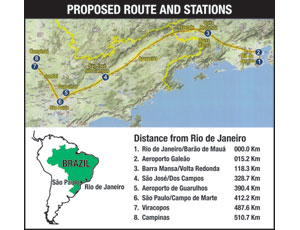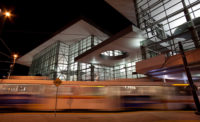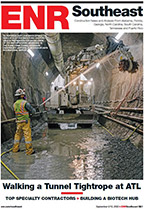When built, Brazil’s first high-speed railroad will speed commuters across the 530 kilometers between Rio de Janeiro and S�o Paulo in just one hour and 30 minutes. But the bidding process has been slowed due to a dispute over procurement rules between the government’s Agency of Land Transportation (ANTT) and the national Audit Court of Brazil (TCU), testing the patience of potential bidders.
Aware of the increasing disillusionment among bidders for the line’s 40-year design-build-maintain-operate contact, the government and court appear to have resolved their differences. Already two months late, the $18.5-billion project now is anticipated to go to bid soon, though under revised terms.
The court and ANTT clashed over the degree of project specification to be included in the bidding documents. ANTT wanted fewer detailed requirements than did the court, so as not to constrain technology choices.
ANTT appears to have conceded to this and other court requirements, making its task of getting the project procured more difficult. The requirements include a 4.3% down-scaling of the project’s maximum allowed cost of $19.3 billion, including operations and maintenance.
Additionally, the winning consortium will not be allowed to raise fares to compensate for any weaker-than-expected forecast revenues, should they arise. Further, extra revenues from advertising cannot be pocketed by the operator but instead will be used to keep down fares.
The court appears also to have dashed the hopes of pilgrims who, every Oct. 12, flock to the small town of Aparecida for a religious festival. Located on the high-speed route, the city succeeded in getting a new station included in the bidding documents; however, with similar requests from city mayors for stations, the court stepped in to rule out all such minor stops.
Officials are now less hopeful of having the line, which has more than 90 km of tunnels and nearly 110 km of bridges, completed in time for the next World Cup soccer tournament, which will be hosted by Brazil in 2014. But completion in time for the Rio de Janeiro-hosted 2016 Olympic Games is still seen as an achievable deadline.
When the Brazilian government announced some time ago that the high-speed-rail line would be built, it triggered the interest of several Brazilian and international private groups of investors. The enthusiasm waned when the TCU came on the scene. However, Japanese, Korean, Chinese, French, German and Spanish groups still seem willing to bid.




Post a comment to this article
Report Abusive Comment